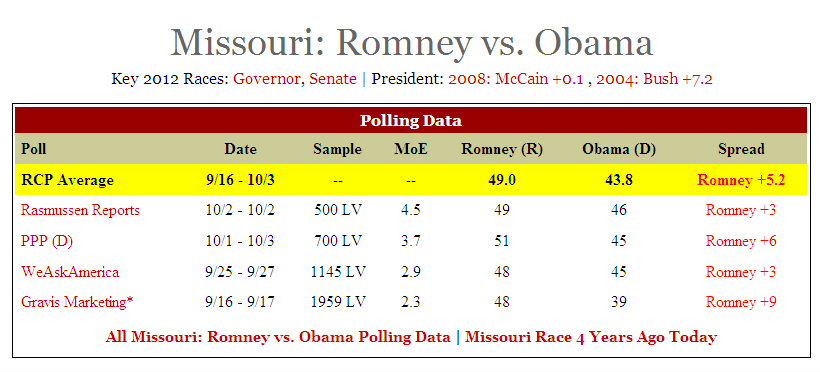|
Another Romney gain at RCP
The last time I reported the RCP electoral vote estimates, two days ago, it was 201 solid or leaning Obama (down from the previous 217), 181 solid or leaning Romney, and 156 Toss Up. Now RCP has moved Missouri from the Toss Up column to Leans Romney. So the new Electoral Map is 191 Obama, 181 Romney, and 146 Toss Up—Romney only ten electoral votes behind, after trailing, a month or two ago, by over a hundred. Now why has Missouri been moved to the leans Romney column? Because the RCP average for Missouri shows Romney 5.2 percent ahead (evidently any margin less than five percent is labeled Toss Up). However, it is a mystery to me what is the basis for the change in the Missouri RCP average to a 5.2 point Romney lead, since the most recent Missouri poll shown by RCP was a PPP poll on October 3: 

UPDATE, October 14: I just re-checked the Missouri page and it hasn’t changed since this entry was posted at 7 p.m. yesterday. However, I now realize that the four most recent polls in Missouri shown in the above RCP chart, all of them done between September 16 and October 3, add up to an average of a Romney lead by 5.2 points. So the question I asked in the original entry is not the correct question. The correct question is not, “Where are the new polls that are being used in this new RCP average of a 5.2 Romney lead?”, but, “Since the average showed a Romney lead of 5.2 points as of October 3, why has Missouri just been moved from Toss Up to Leans Romney on October 13?”
Your hesitation about the phrase “the data is,” is well-founded. The singular (the term is Latin) is datum, “something given.” Data would be the plural—hence, “the data are,” not “the data is.” English makes a derivative distinction in the term a given, pluralizing it in the usual way as givens. We could say alternatively that, the facts are; or the information is …LA replies:
I can’t stand it when people say “That’s an interesting phenomena,” instead of the singular form, “phenomenon.” Once in the 1980s I was in Myrtle Beach, South Carolina and walking over a dune toward a beach. As my companion and I passed close to a group of people walking the other way, from the beach, a man in the group, speaking to his friends, said something like, “It’s an interesting phenomena.” I said, “Phenomenon.” He said, “Are you an English teacher?” I replied, “No, an English speaker.”LA continues:
Another thing that bothered me was when the New York Times stopped using the beautiful, evocative word, “millennia,” and replaced it by “millenniums.” Posted by Lawrence Auster at October 13, 2012 07:46 PM | Send Email entry |